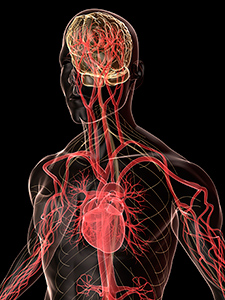Office of Research & Development |
 |
Office of Research & Development |
 |

VA Research Currents archive
February 4, 2015

A recent VA study on depression and angina—heart pain—yields new insights on the heart-mind connection. (Photo: © iStock/Eraxion)
Veterans with depression are more likely to complain of increased chest pain related to ischemic heart disease, a VA study finds. The results, published online in the Annals of Behavioral Medicine in July 2014, suggest that changes in depression symptoms could affect angina, or chest pain, perception.
The greater the perception of chest pain, say the researchers—regardless of the extent of the actual underlying heart disease—the greater the likelihood of cardiac interventions. And multiple procedures and tests not only are costly, but can negatively affect quality of life.
Lead author on the study was Dr. Ranak Trivedi, an investigator at the Center for Innovation to Implementation, at the VA Palo Alto Health Care System.
Veterans with new-onset depression were affected the most dramatically, reporting more chest pain and physical limitations along with poorer quality of life. Those who were persistently depressed also scored higher (worse) in those categories than patients with ischemic heart disease who were not depressed.
The study is the latest in a series of trials that have found a relationship between mental health and chest pain. A 2003 VA study published in the Journal of the American Medical Association, for example, linked depression with more chest pain and lower quality of life in heart patients, and recommended strongly that depression be assessed and treated in these patients.
For the new study, 569 Veterans with ischemic heart disease from around the country were given the Seattle Angina Questionnaire, a 19-item measure that aims to assess a patient's chest pain. They also were rated for depression via a health questionnaire. Across the board, Veterans who scored over 10 on the depression scale, meaning they experienced clinically significant depressive symptoms, also had higher perceptions of chest pain.
That physical and psychological symptoms would be related is not entirely surprising. But in the case of depression and heart disease, questions still exist as to how one condition drives the other—and whether the relationship is truly two-way. It would make sense that if a Veteran has frequent and debilitating chest pain, he might become more depressed. But by the same token, depressed people might engage in certain negative health behaviors—such as not exercising—that set the stage for heart disease.
From Trivedi's findings, at least, it appears to be the depression that's driving the increased perceptions of chest pain.
The team followed up with the participants after one year, again testing for both angina and depression, and examining trends in both conditions. "The results of our study," the researchers concluded, "indicate that clinically significant depression is associated with greater angina symptoms and poorer quality of life among patients. However...while depression was predictive of chest pain, the reverse was not true."
Still, Trivedi acknowledges that "there are many pathways linking depression and cardiovascular disease. She adds that "unraveling the complex relation among these conditions may lead to strategies that decrease unnecessary cardiac testing, treatment, and procedures." And that, she says, can have dramatic effects on patients' quality of life.